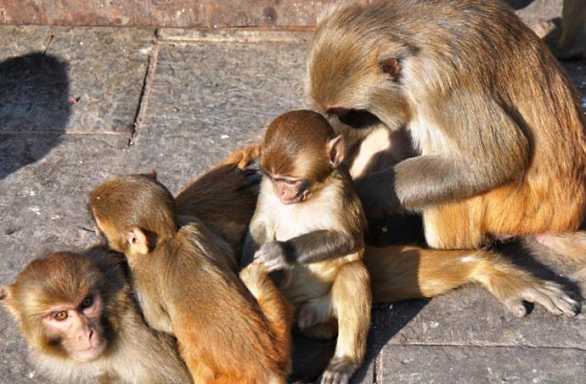But evolutionists suggest that when animals help animals who are their genetic relatives, or who are likely to return the favor later on, they are actually helping their species to survive the process of natural selection.
但進(jìn)化論者認(rèn)為,當(dāng)動(dòng)物們?cè)趲椭切┻z傳親屬,或可能會(huì)在稍后回報(bào)其所提供的這種幫助時(shí),它們實(shí)際上是在幫助它們的種群能夠在自然選擇的過(guò)程中存活下來(lái)。
Some animals will even sacrifice their own lives to insure the survival of the larger group.
某些動(dòng)物甚至?xí)奚约旱纳员H蠓N群的存活。

The worker honeybee, for example, will die defending her hive if necessary.
比如說(shuō)工蜂,在保護(hù)蜂巢的過(guò)程中就會(huì)不惜犧牲生命。
Even acts that seem selfish may end up helping the group in the long run.
甚至,某些看上去貌似自私的行為實(shí)際長(zhǎng)遠(yuǎn)看來(lái)也有助于種群存活。
For instance, when there isn't enough food to go around, wasps and termites will cannibalize their nest-mates.
比如說(shuō),當(dāng)附近沒(méi)有足夠的食物時(shí),黃蜂和白蟻就會(huì)對(duì)它們同族的伙伴進(jìn)行蠶食。
Gruesome as this may seem, it insures the colony's survival through tough times.
也許聽(tīng)上去很可怕,但實(shí)際上這保證了艱難時(shí)期種群的存活。
Although here at A Moment of Science, we don't condone human cannibalism, we still hope that these examples of altruism in animals will give you some food for thought.
我們《科學(xué)一刻》欄目雖然不能寬恕人類(lèi)自相殘殺的行為,但我們希望,這些存在于動(dòng)物之間的利他主義將會(huì)帶給大家一些發(fā)人深省的思想。












